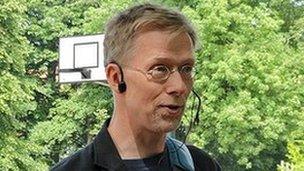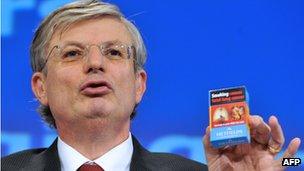Lobbyists puff and blow over new EU tobacco rules
- Published

Olivier Hoedeman criticises the tobacco industry's lobbying tactics in Brussels
Olivier Hoedeman takes people on unusual tours of Brussels - he opens their eyes to the billions of euros that multinationals, unions and campaign groups spend trying to shape - even rewrite - the European laws made there.
The research and campaign coordinator of Corporate Europe Observatory - which monitors lobbying - pauses outside a smart office block, a few streets away from the European Parliament.
He points to the second floor and the offices of British American Tobacco. It has seven full-time lobbyists here and Mr Hoedeman says the tobacco industry as a whole employs around 100 in Brussels, spending more than 5m euros (£4.3m; $6.6m) a year.
Those numbers have grown as the industry fights proposed new regulation.
The European Commission is beefing up the Tobacco Products Directive, to try to dissuade young people from smoking.
So, for example, there would be a ban on menthol cigarettes and some other flavourings and bigger pictorial health warnings on packets.
Lobbying battlefield
Tobacco firms "directly lobby MEPs, trying to meet with him or her to talk them into tabling amendments, but also [organise] social events, like dinner parties for MEPs' assistants," Mr Hoedeman says.
"We have already seen in several of the votes of committees of parliament that the Commission's proposals are being weakened. It shows they're gaining ground and achieving that goal."
The lobbying appears to be having an impact. Almost 1,500 amendments to the tobacco directive have been tabled.
The EU's health ministers, for example, voted to drop a ban on slim cigarettes, and reduce the size of the graphic health warnings, from the 75% the European Commission wanted, to 65%.
But last week the parliament's public health committee voted to keep that ban, , externalas well as a ban on cigarette flavourings, and backed the 75% target. So more hard bargaining lies ahead, and the full parliament will vote on 10 September.
The EU has an online database of lobbyists called the Transparency Register., external But it does not tell the whole story: the register is voluntary and hundreds of lobbyists simply choose not to reveal themselves. There is no information about whom they have lobbied.
Special rules are supposed to apply to the tobacco industry. The EU has signed up to a World Health Organization treaty which says politicians should avoid meeting tobacco companies; if they must, the meeting has to be transparent.
But the British MEP piloting the tobacco legislation through parliament, Linda McAvan, says that away from the main lobbying battlefield the tobacco companies have been firing salvoes below the radar.
She accuses one of ringing her constituency office, posing as a representative of small retailers to demand an urgent meeting.
'Legal company'

Tonio Borg from Malta is now negotiating for the EU Commission on the revised directive
Other tobacco lobbyists, she said, have been handing out anonymous amendments to MEPs, in the hope they will be put forward.
"If they think it's legitimate, why are doing it like that? Why don't they just operate like every other company that lobbies the European Parliament and just send it out in a normal email? I think they know that if people know they're from the tobacco industry, they'll be suspicious of the arguments they make," said Ms McAvan.
Ronan Barry describes himself as a corporate affairs professional for British American Tobacco and heads their Brussels lobbying operation, which cost nearly 1m euros to run last year.
He says his company is always open and honest, and he does not recognise the tactics described by the MEP.
He believes tobacco companies have as much right to meet MEPs as any other business and says the scale of the tobacco lobby is often exaggerated.
"We sell a legal product and are a legal company and therefore have a role to play in communicating our point of view to people who make decisions that impact upon us.
There are certainly at least as many lobbyists arguing against our positions as there are arguing for them, so it's not true to say there are armies of us here lobbying," said Mr Barry.
A British Conservative MEP, Martin Callanan, echoed that view. "This idea they put across that it's a sort of David and Goliath - these industrial giants with thousands of well-paid, suited lobbyists and only one or two little NGOs representing the oppressed common man is very, very far from the truth - it's the other way round if anything."
On average, non-governmental organisations (NGOs) in Brussels get 43% of their funding from EU institutions., external
'Billions of euros'
In the past year the lobbying debate on both sides has been overshadowed by a scandal involving the former commissioner who was supposed to be driving the tobacco directive, John Dalli.
At the centre of so-called "Dalligate" is an allegation that a friend of Mr Dalli asked for 60m euros to overturn a ban on snus - a moist chewing tobacco which you put under your lip.
Mr Dalli and his friend both strenuously deny the allegation.
An investigation by Europe's anti-fraud office Olaf says that although it has circumstantial evidence linking Mr Dalli to the bribe request, that evidence is not conclusive., external
Speaking from his home in Malta, Mr Dalli claims he is the victim of a conspiracy: "I was considered as a person who was very hard on the tobacco industry and they didn't want that during their campaign.
"I'm already hearing about a lot of dilution that is being made to the directive because of the tobacco lobbies that have been very active.
"I'm afraid that what's going to go through, if it goes through, is not as effective as one would like and what is the gain? The gain is billions of euros."
- Published14 July 2013
- Published25 October 2012
- Published19 December 2012
- Published6 July 2013
- Published4 March 2011